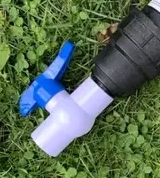1. **Gather Materials**: You will need drip tubing, emitters, stakes, a connector, a filter, and a pressure regulator. You may also need a timer for automatic watering.
2. **Plan Your Layout**: Sketch your garden layout, indicating where each plant is located. This will help you determine the length of tubing needed and where to place the emitters.
3. **Cut the Tubing**: Measure and cut the drip tubing to the required lengths based on your garden layout.
4. **Install Emitters**: Insert emitters into the tubing at the appropriate spacing for your plants. Use one emitter per plant for efficient watering.
5. **Connect the System**: Connect the drip tubing to the water source using the pressure regulator and filter to ensure clean water flow.
6. **Lay Out the Tubing**: Position the tubing on top of or slightly buried in the soil around your plants. Secure it with stakes to keep it in place.
7. **Test the System**: Turn on the water and check for leaks or clogs. Adjust the emitters as necessary to ensure even watering.
8. **Set Up a Timer**: If desired, install a timer to automate watering schedules, ensuring your plants receive consistent moisture.
9. **Monitor and Adjust**: Regularly check the system for efficiency and adjust emitter placement or watering times based on plant needs and weather conditions.







